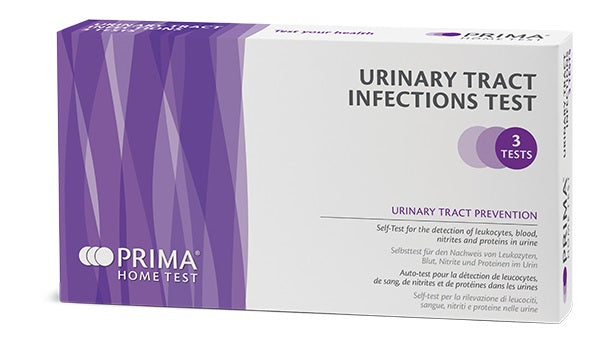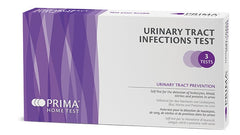

Prima Urinary Tract Infection Test – 3 Tests
- (-0%)
- Unit price
- per
Couldn't load pickup availability
Description
xDescription Urinary Tract Infection Test WHAT IS THE URINARY TRACT INFECTIONS TEST FOR? The Urinary Tract Infections Test (UTI) is thought to be performed at home and allows to verify the presence of leukocytes (white blood cells), blood, proteins and nitrite in urine. Abnormal levels of these parameters within the urine are often symptoms of urinary tract infections. SYMPTOMS OF URINARY TRACT INFECTIONS UTI is a collective term that describes any infection involving any part of the urinary tract, namely the kidneys, ureters, bladder and urethra. They represent one of the most frequent pathologies of this apparatus. Around 40/60% of women in the world develop urinary tract disorders at least once in their lifetime, of which about 10% suffer at least once a year. Men are subject to this condition only in 12% of cases, thanks to a different anatomical conformation of this apparatus. Causes reside mainly in some bacteria, including the well-known Escherichia coli. The most common symptoms of a possible inflammatory condition due to an urinary tract infection are: burning, urgent need to urinate, dysuria (difficulty in urinating), pain in the lower abdomen, production of cloudy urine, inability to empty completely the bladder and, in severe cases, also fever, lumbar pain and tremors. WHO DOES USE THE UTI TEST? The Urinary Tract Infection Test is useful for anyone, both men and women, suffering from occasional or recurrent disorders of the urinary tract. The Test should be performed in presence of the following symptoms: excessive frequency and/or burning during urination, turbid and/or bad-smelling urine. HOW DOES THE URINARY TRACT INFECTIONS TEST WORK? The Urinary Tract Infection Test consists of plastic strips on which are applied several reactive areas: once in contact with the urine sample they change color depending on the concentration of leukocytes, blood, proteins and nitrites. The UTI Test is intended for semi-quantitative analysis in urine of the above-mentioned parameters which, if present in a higher level than the normal, may be the alarm bell of any infectious state. The comparative chart provided with the Test allows you to easily read the results and identify any altered values. WHEN SHOULD I DO THE UTI TEST? Suffering from disorders related to the urinary tract are mainly women, because the short urinary ducts favor the establishment of pathogenic germs. Men are less affected by urinary tract infections, but with age advancing they will be subjected to frequent prostate controls which, if inflamed, tends to increase its volume, causing a difficulty in the urine outflow. That’s why it’s important to keep your urine sterile and bacteria-free.
Related Products
- (-0%)
- Unit price
- per
- (-0%)
- Unit price
- per
- (-0%)
- Unit price
- per
- (-0%)
- Unit price
- per
- (-0%)
- Unit price
- per
- (-0%)
- Unit price
- per
- (-0%)
- Unit price
- per
- (-0%)
- Unit price
- per
- (-0%)
- Unit price
- per
- (-0%)
- Unit price
- per
Recently Viewed Products
- (-0%)
- Unit price
- per
- (-0%)
- Unit price
- per
- (-0%)
- Unit price
- per
- (-0%)
- Unit price
- per
- (-0%)
- Unit price
- per
- (-0%)
- Unit price
- per
- (-0%)
- Unit price
- per
- (-0%)
- Unit price
- per
- (-0%)
- Unit price
- per
- (-0%)
- Unit price
- per
- Choosing a selection results in a full page refresh.



